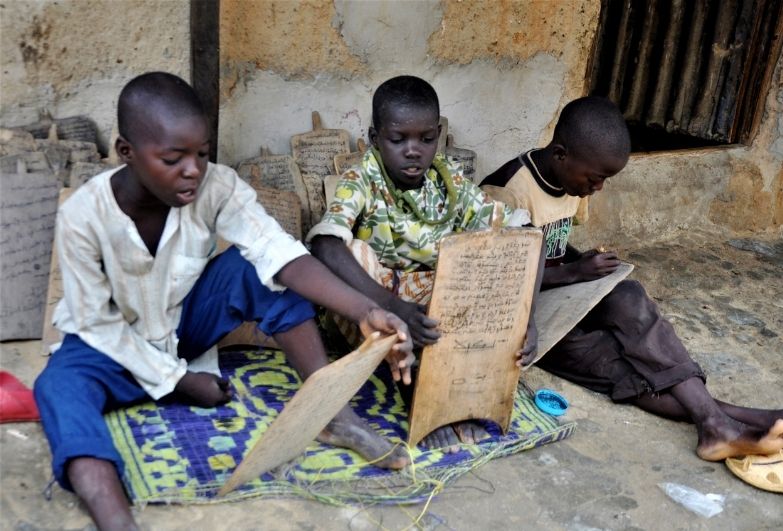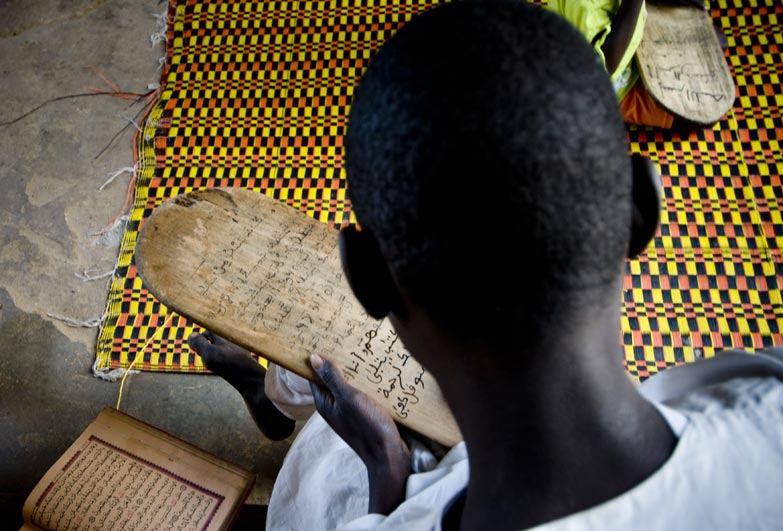A blog by Africa Programme Officer Kenza Ben Azouz.

10 December 2020
In 2017, I moved to Maiduguri, Northern Nigeria, where I worked delivering aid to some of the worst-off communities. The sight of ill-dressed, numb-looking children chasing cars and passers-by, in search of food, money, or attention was commonplace. Yet, when I asked my colleagues about these children – who were not part of our aid program – I was met with a matter-of-fact ‘these are the Almajirai’, sometimes with a brief explanation of the tradition that had prescribed them to the streets.
Oddly, the evidently poor and marginalised Almajirai did not seem to be a priority for any of the countless INGOs roving Northern Nigeria, nor were they a priority of federal or state authorities. It is tempting to write off this neglect as an aberration, but it is much more complex than this; Northern Nigeria is struggling with protracted and multi-layered humanitarian and human rights crises. In a region where the Boko Haram insurgency has terrorised and displaced millions and killed tens of thousands, many communities are living in constant, urgent need for help, and there is fierce competition over state and non-state resources.

The best prospects for combatting forced child begging in Nigeria.
New research investigates why interventions have failed to halt the damaging practices of modern Qur’anic schools.
The 10-centuries-old Almajiri system was originally community-sustained and highly respected. Before widespread public education was introduced, Qur’anic schools provided a chance for children from poor families to access education and increase their opportunities in life. Children would do some seasonal farm work and other small jobs. This work was seen as an act of supplication, and the children would receive alms to support their school in return. Begging on the streets was not a common practice as it is today.
Since the 1980s, the Almajirai system has been under unbearable pressure to meet wider demands for education in marginalised rural communities. Underfunded and largely unregulated, it has increasingly resorted to exploitation, expecting students to sustain masters, schools, and themselves through begging and child labour. The Almajiri system’s new lucrative potential has gradually made it a home for an exploitative regional child trafficking industry.
Today, millions of Almajirai live under extremely austere conditions, sleeping in squalid and overcrowded schools and spending most of their time roaming the streets in search of food, or money. They are exposed to physical, psychological and sexual violence by strangers, and Qur’anic Masters themselves. They are denied a diversified education and vocational skills that are vital to their adult development. Distressingly, our research found that what Almajirai, growing up without their parents and abandoned by their Government, suffer the most from is an acute sense of loneliness.
There is no simple solution to tackle forced child begging and the human rights violations the Almajirai face. Narrow criminalisation of begging, without addressing hunger – the main driver of forced child begging – will only further marginalise the Almajiri community. Wider access to food and formal education, and stronger child protection and law enforcement are all equally needed to address the issue. While federal and state governments must re-commit to their responsibility under domestic law to care for these children, a dramatic escalation of support from all partners (Almajirai communities, parents, civil society, humanitarian, development and human rights INGOs, and global financial institutes) is urgently needed. All must learn from the successes and failures of past interventions as well as from ongoing informal localised community efforts to support the Almajirai.
The longer the plight of the Almajirai is ignored, the bleaker the prospects for dignity, human rights and socio-economic justice in Nigeria, and the greater the threat to regional and international security as these abandoned children are ideal prey for terrorist and trafficking networks in the Sahel.
Learn more about Forced Child Begging in Nigeria in our recent report: Shackled to the past
This report is part of a project working to end forced child begging across West Africa. Find out more about our work on forced child begging in Niger and Senegal.